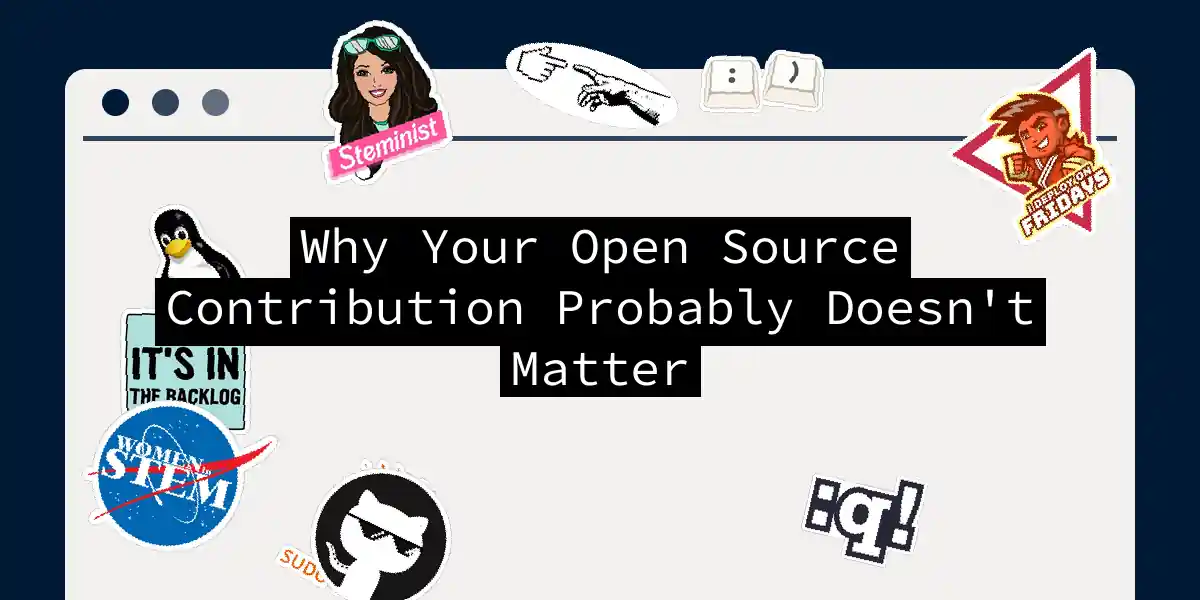The Harsh Reality of Open Source Contributions
When you decide to contribute to an open source project, you’re often driven by a mix of altruism, a desire to learn, and perhaps a hint of ego. You envision your code being used by thousands, your name etched in the project’s history, and the gratitude of the community. However, the reality is often far from this idealistic picture.
The Maintenance Burden
One of the most significant issues with open source contributions is the maintenance burden. When you submit a pull request (PR), you’re not just adding a feature; you’re also adding to the project’s long-term maintenance costs. This can be overwhelming for maintainers, who often find themselves shouldering the bulk of the workload.
Maintainers have to consider whether your contribution is a good addition in the long term, how much maintenance it will require, and whether it will make the project easier or harder to evolve. This careful balancing act can lead to frustration for both contributors and maintainers.
The Cold and Critical Culture
Open source culture, while beneficial in many ways, can also be cold and critical. New contributors often feel vulnerable and exposed when sharing their code with the world. The fear of criticism and the pressure to meet the project’s standards can be daunting.
Imagine submitting your first PR to a popular project and receiving a barrage of comments pointing out every minor flaw. It’s like standing naked in front of a crowd, waiting for someone to notice the smallest imperfection. This environment can be intimidating, especially for new developers.
The Gift Economy and Reputation
Open source operates on a “gift economy,” where reputation is the currency. Eric Raymond’s The Cathedral and the Bazaar highlights that in this economy, abundance rather than scarcity is the rule. However, this also means that your contributions are judged by your peers, and your reputation is on the line.
If you’re new to open source, contributing can feel like a test of your skills. You’re not just fixing a bug or adding a feature; you’re also proving yourself to the community. This pressure can be significant, especially when you’re contributing to projects that have been around for years or decades.
The Numbers Game
Despite the large number of developers on platforms like GitHub, the actual number of contributions per person is surprisingly low. GitHub’s 2022 report shows that out of 94 million developers, there were only about 413 million open source contributions, averaging around 4.3 contributions per person per year.
This disparity highlights that while many people are involved in open source, the majority of the work is concentrated among a few dedicated contributors. The rest are often passive observers or occasional contributors.
The Reality of Project Neglect
Many open source projects are neglected, not because they’re bad, but because they lack the necessary support and resources. Projects that thrive usually have a business model or significant backing behind them. Without this support, projects can wither away, leaving contributors feeling their efforts were in vain.
Personal Reflections and Pains
As someone who has contributed to open source projects, I can attest to the mixed feelings that come with it. There’s the initial excitement of seeing your code merged, followed by the realization that your work is just a drop in the ocean. You might receive little to no feedback, and the project might not even acknowledge your contribution in any meaningful way.
I recall a project where I spent hours improving the documentation, only to have my PR rejected without a clear reason. It was like pouring your heart into a letter and having it returned unopened. The lack of communication and the cold rejection can be disheartening.
Conclusion: Why It Still Matters
Despite all these challenges, contributing to open source is still valuable. Here are a few reasons why:
- Recognition and Experience: Even if your contribution doesn’t change the world, it can earn you recognition within the community and valuable experience.
- Community Engagement: Open source projects often foster a sense of community. Contributing can connect you with like-minded individuals and provide a sense of belonging.
- Personal Growth: Working on open source projects can help you develop new skills and tackle complex problems in a real-world setting.
Final Thoughts
Contributing to open source is not about changing the world overnight; it’s about being part of a larger ecosystem. It’s about learning, growing, and giving back to the community that has given you so much.
So, the next time you think about contributing to an open source project, remember that your contribution, no matter how small, is a step in the right direction. It might not matter in the grand scheme, but it matters to you, to the maintainers, and to the community.
And who knows? Maybe one day, your small contribution will be the spark that ignites something big. Until then, keep coding, keep contributing, and keep dreaming. Because in the world of open source, every bit counts, even if it doesn’t always feel like it.
